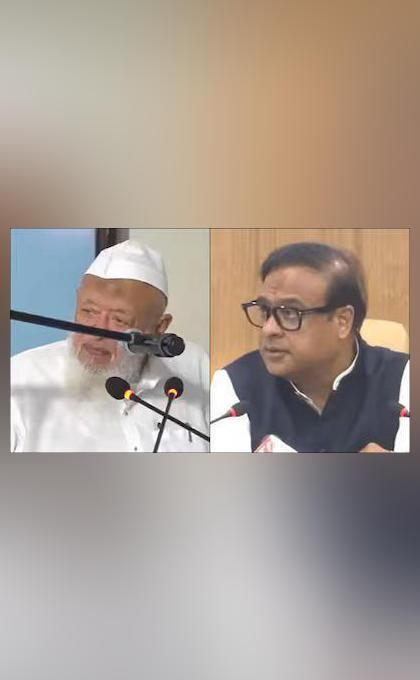
Title: I had once asked Sonia not to give ticket to Himanta: Madani
The politics of India is known for its dramatic twists and turns, and the latest development in the Assam politics is no exception. Jamiat Ulama-i-Hind chief Arshad Madani has sparked a row by claiming that he had once asked Congress president Sonia Gandhi not to give a ticket to Chief Minister Himanta Biswa Sarma when he was a member of the Congress party. Madani’s statement has sent shockwaves across the political spectrum, with the Bharatiya Janata Party (BJP) reacting sharply to his remarks.
During a press conference in Delhi, Madani made the startling revelation, saying, “I had once asked her (Sonia Gandhi) not to give a ticket to Himanta…as he had RSS mentality. Now, he’s setting Assam on fire by harassing Muslims.” Madani’s statement has raised several questions, including whether a Maulvi (Islamic scholar) has the right to decide who gets a Congress ticket.
The BJP has taken strong exception to Madani’s remarks, asking, “Do Maulvis decide who gets Congress tickets?” The saffron party has also accused Madani of trying to divide the people of Assam along communal lines. “It’s unfortunate that Jamiat Ulama-i-Hind chief has chosen to make such irresponsible and divisive remarks,” said a spokesperson for the BJP.
Madani’s statement is significant because it reveals the deep-seated differences within the Congress party. Himanta Biswa Sarma was a key functionary of the Congress party in Assam before he joined the BJP in 2015. During his stint in the Congress, Sarma was known for his proximity to the RSS and was often seen attending RSS events.
The Congress party has been trying to navigate a delicate balance between its secular and communal wings. While the party’s ideology is rooted in secularism, it has also had to contend with the presence of leaders who have RSS connections. Sarma’s move to the BJP has been seen as a significant blow to the Congress party’s efforts to project itself as a secular force.
Madani’s statement is also significant because it highlights the growing tensions between the Muslim community and the BJP-led government in Assam. The BJP has been accused of pursuing a communal agenda in Assam, with many Muslim leaders and activists claiming that the party is trying to marginalize the community.
The BJP’s response to Madani’s statement has been swift and sharp. “It’s unfortunate that Jamiat Ulama-i-Hind chief has chosen to make such irresponsible and divisive remarks,” said a spokesperson for the BJP. “The Congress party has always been known for its communal politics, and Madani’s statement is just the latest example of this.”
The Congress party has also weighed in on the issue, with its spokesperson saying that Madani’s statement is an attempt to destabilize the government in Assam. “The Congress party has always been committed to secularism and social harmony,” said the spokesperson. “Madani’s statement is an attempt to create communal tensions and destabilize the government in Assam.”
The controversy surrounding Madani’s statement has also raised questions about the role of Maulvis in Indian politics. While Maulvis have traditionally played a significant role in Indian politics, their involvement in party politics has often been controversial.
In recent years, there have been several instances of Maulvis getting involved in party politics, with some even joining political parties. While some Maulvis have been successful in their political careers, others have been criticized for their communal views and actions.
The controversy surrounding Madani’s statement has also highlighted the deep-seated divisions within Indian society. The country’s politics is often marked by communal tensions, with different communities often having competing interests and agendas.
In conclusion, Madani’s statement has sparked a row in the Assam politics, with the BJP reacting sharply to his remarks. While the statement has raised several questions, including whether a Maulvi has the right to decide who gets a Congress ticket, it has also highlighted the deep-seated divisions within Indian society.






